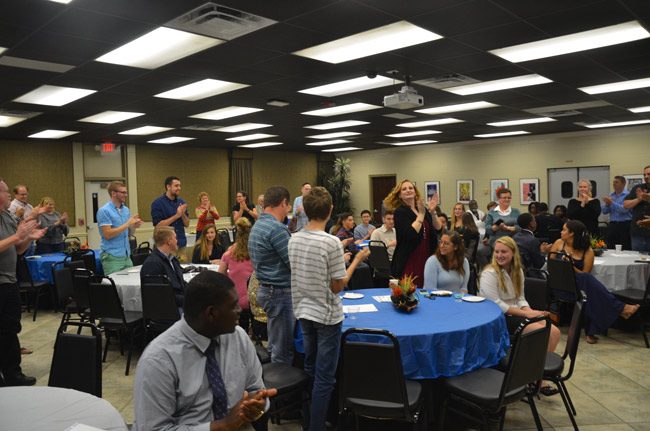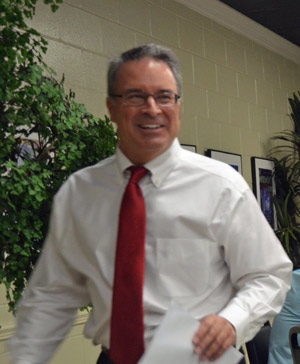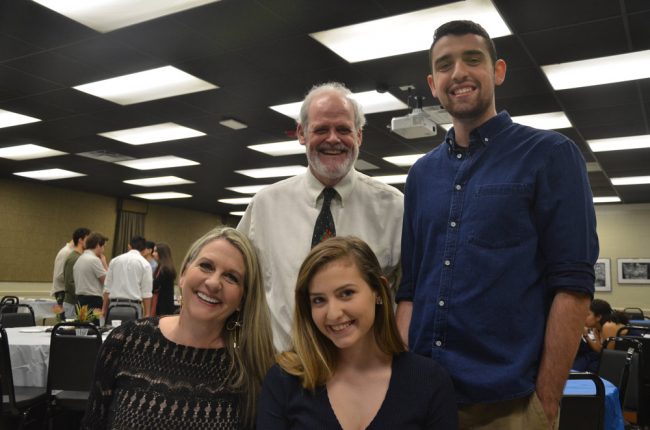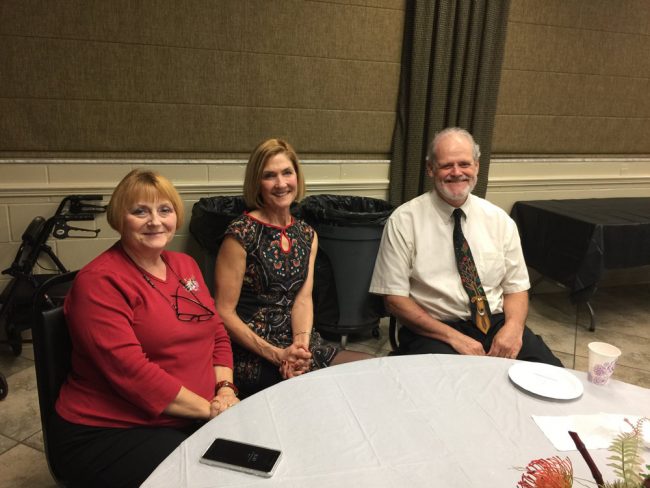
It’s not a graduation ceremony exactly, but close. And like all things related to the International Baccalaureate—better known as IB, the most rigorous standardized academic program on the planet—it stands out: it wasn’t until an evening in late December that the Flagler Palm Coast High School IB Class of 2017 returned there to claim diplomas in a modest ceremony attended by faculty, parents, and a few IB students from former years.
It’s part of IB’s quirks that students don’t actually find out of they passed their courses and got their IB diploma until July. And the diplomas aren’t mailed out until months later. But for FPC it’s been an annual reunion of sorts, and a way to shed additional light on the school’s most challenging program, and its most academically successful students.
The Class of 2017 stood out in a few other ways: With a 74 percent success rate—three points above the world average– it’s the most successful at FPC in the more than dozen years that the IB has been around, with the sole exception of the very first graduating class. But that one was three times smaller than the 40 students who ended with the Class of 2017, thirty-one of whom got their diploma.

The class also sent two graduates to Columbia University, two to Wake Forest University and two to Drexel University, and for the first time got graduates into Wellesley College, Washington and Lee University and Davidson College. Florida State got the most graduates—eight. The University of Florida got five.
“We’ve had lots of conversations about this group over the last couple of years,” Dusty Sims, the FPC principal, told the assembly at the school’s Bistro. “This group was a very special group to me. You’re my first IB class as a principal, but you’re the class that I felt embraced Flagler Palm Coast High School the most. You loved school, you enjoyed being here, you enjoyed all the activities that went on while you were here. The other things that I loved about this class were, you were colleagues. You shared, you collaborated, you worked together, you weren’t individualistic, you shared the hard stuff, you laughed at the fun stuff, but you did it all together.”
FPC's IB Class of 2017: Their Colleges
| Student | School |
|---|---|
| Adrianna Bigwitch | Columbia University |
| Ivana Moore | Columbia University |
| Drew Harris | Daytona State College |
| Daniel Thomas | Davidson College |
| Ayden Craig | Daytona State College |
| Megan Kisner | Daytona State College |
| Anna May Bus | Drexel University |
| Christian Michael Ear | Drexel University |
| Preston Harvey | Edward Waters College |
| Ayden Craig | Embry-Riddle Aeronautical University (spring semester) |
| Kamrin Raye Bunn | Flagler College |
| Marcel Baldassarri | Florida International University |
| Ayden Craig | Florida Polytechnic University |
| Sierra Biggs | Florida State University |
| Isabella Alyse Del Greco | Florida State University |
| Jake Ekberg | Florida State University |
| Christian Gazzoli | Florida State University |
| Nathan Allen Higgins Jr. | Florida State University |
| Jaia Jolyn Huggins | Florida State University |
| Lana Claire Schultz | Florida State University |
| Mikhail Vassilyev | Florida State University |
| Cassandra Gubala | Nova Northeastern University |
| Anabella Giuliano | Rollins College |
| Lauren Ruth Jackson | St. Johns River State College |
| Anna Baj | Stetson University |
| Jessica Gundy | Stetson University |
| Austin Barger | University of Central Florida |
| Jonathan Hernandez-Cooper | University of Central Florida |
| Cody Clifford Kaufman | University of Central Florida |
| Judy Lynn Colindres | University of Florida |
| Alan Doron | University of Florida |
| Nina Jones | University of Florida |
| Maetavee Shubeck | University of Florida |
| Anna Walls | University of Florida |
| Casey Rinella | University of South Florida |
| Brandon Santiago | University of South Florida |
| Joell Jonathan Wright | University of South Florida |
| Mark Zevallos | University of South Florida |
| Abby Emma Duquette | Wake Forest University |
| Kelvin Dinh Tran | Wake Forest University |
| Melissa Victoria Yorio | Washington and Lee University |
| Elizabeth Mason | Wellesley College |
The International Baccalaureate program was founded 50 years ago this year in Geneva and has since grown to 146 countries in 4,783 schools: FPC’s 40 students were among 85,508 IB candidates across the United States in 2017. No other country comes close. (Canada is second with 11,000.) It is as famously challenging as its students are successful in earning acceptance to top universities. The chances of making it to those universities are considerably slimmer without an IB diploma. Yet the IB still gets maligned here and there, mostly because of misinformation or prejudice: it’s too rigorous, goes the claim, it prevents students from having a social life, it prevents students from engaging in extra-curriculars or sports.
All false claims, discredited foremost by the students themselves.
“When I went into it,” says Elizabeth Mason, the first student out of FPC to make it to Wellesley, where she’s on a pre-med track at age 17 no less, “it seemed very scary that you couldn’t do anything else, like you couldn’t be in sports or do too many extra-curriculars because IB was so time-consuming. But it seems that most extra-curriculars are made up by IB students. You really have as much time as you want if you know how to handle it and know how to prioritize when you have to and get work done when you have time to get it done.”
Or take Daniel Thomas (Davidson College) and Anna Buss (Drexel University): they were able to make it through their high school years by going to sleep at 10 p.m. or a bit later, usually getting their eight hours. They’re quick to point out the myths about IB. “Everyone thinks you can’t have a social life in IB. But you can,” Buss said. How? “Time management. Study groups.” Not to mention the good training it provided for college. Buss and Thomas both say they were able to adapt to college much quicker than many other students around them thanks to IB.
“Yesterday I was talking to a few students about how IB really helped me and my college course work now at Davidson,” Thomas said of speaking to current IB students at FPC. “And going into Davidson it was either you did IB, you did a full AP curriculum, or you went to super-private boarding school somewhere like northeastern Europe or something. And being from such a small community and do such a rigorous program that’s at an international level really allowed me to compete.”
But Thomas notes: “It’s not instant gratification as with AP [Advanced Placement] and dual enrollment. You really have to put in a lot of work throughout the four years in high school. With AP you take a class and you get a score right after and you know you passed the course. It’s like, end-all. With IB you really have to work hard in all your classes.” There are internal assessments, a required and very extensive community project that can take up the better part of a year, the famed “extended essay” that adds up to the equivalent of a thesis, and a final grade only after two years of work on higher-level classes and a full year of work on standard-level courses. “You’re working at it for basically two or more years to get to the point of getting your IB diploma like we did today.”
“I also think IB makes you very well-rounded. With AP you can play to your strengths and do what you’re good at, but with IB you’re kind of forced to work on everything,” Buss said. “If you’re willing to put in the work and the effort and you want the challenge, then definitely stick with it because it does prepare you.”
Mason, the 17 year old now at Wellesley, IB has been a family affair: both her twin bnrother and sister, Forrest and Alexandria, graduated through FPC’s IB program in 2014. Forrest is attending UF (he just got accepted into five dental schools) and Alexandria is attending Stetson. And their mother, Bobi Mason, didn’t attend IB, but she’s attending UF too—rooming with her son—and getting a degree in occupational therapy. Four Masons, all in college at the same time. Scholarships are helping, and Elizabeth is on a near-full ride at Wellesley, where tuition is $47,000; with room and board it’s $63,000.

Not that the IB at FPC hasn’t had its lows. The Class of 2017 is emerging from just such a low.
“This class is highly significant because it was almost as if the IB program was breaking down as far as the students were concerned,” says Warren Sanson, who with Dianoe Tomko (Theory of Knowledge) and Debbie Couch (English) forms IB’s Holy Trinity at the school. “They were starting to say, oh, we don’t really need the IB diploma, that’s no big deal, and so they were just kind of studying hard in places they needed to and doing what they minimally had to, then weren’t passing the IB exams that they had to. So it kind of came to a head. Colleges had started to pick, this up. I’m talking big schools, like Chapel Hill. And Harvard. They now have on the acceptance, if you’re in the IB program, ‘This is contingent on you getting an IB diploma,’ which you don’t even know you get until July. So what happens is, if you don’t have an interest in it, and we’re warning all the kids about that—that they’d better make sure they understand the fine print on their acceptance letter and really how important it is to get the diploma. So that’s helping, and this class is major help. It seems now that the seniors we have this year and following them, the juniors, are all headed straight to get their IB diplomas. They really have that goal in mind.”

Past IB students typically react wistfully for their IB years, and now a bit enviously, too, for what coming IB students have at FPC. But it’s not as if they’re not themselves enviable. “Parents,” Sims told the assembly in December, “you should be extremely proud of these young people, they’re going to make their mark on the world, and I’m proud to say that they came out of Flagler Palm Coast High School. So thanks for being awesome and amazing and being role models for those who have a high bar set behind you. They have to try to reach that. You guys have moved it way up there for them, and I thank you for that.”





























Miah Mahoney says
That’s so great to see. Congratulations to all the students, parents, and teachers for all the hard work you put in to make that happen.
Frances Royals says
Congratulations to the students, teachers, Roger Tangney and Phil DeAugustino! The IB Program sounds like a great one and I’m very happy that FPC offers this curriculum to the students. A lot of hard work goes into a successful program like this one!
James Manfre says
The IB program provides the best of both worlds, the vigorous curriculum of a prep school and the economic and social diversity that is inherent in a public education. I have had two of my sons graduate from the program with great success. Alec who attended Georgia Tech on a scholarship and Barret who is at Duke we’re both prepared by the IB program to compete with some of the brightest students in the country and the world. It is an asset to our school district and community to have such a prominent and internationally recognized program. The credit most go to the past superintendents, Bill Delbrugge and Jacob Olivia for starting and supporting IB especially when some have questioned its value. The teachers you mentioned have been invaluable to the program not only for their inspirational teaching, but also for the life lessons they have imparted to their students.
gmath55 says
The International Baccalaureate program was founded 50 years ago this year in Geneva. I never heard of this program when I graduated from high school in 1973. I only needed to write a letter why I want to attend college and three letters of recommendations from my high school teachers to get into college. I was an average student at a public high school. Never took SAT test or those other tests to get in college. I went to a private college Lawrence Tech University. Guess what? I graduated with honors in Mechanical Engineering. I also received an A.S. in Computer Programming (Software Engineering) at DBCC.
It does prepare you? May be true for some students but not all. If you just go to college out of high school and put in the work, want the challenge, and stick with it you accomplish the same thing. Again, what is the point of receiving an IB? Oh, college isn’t for everybody and that is why we have trade schools where you get paid as you train.
Joan says
When thanking those responsible for this program, don’t forget to mention Diane Tomko who I believe has been with the IB program at FPC since the beginning. A wonderful teacher and inspiring human being. Thank you to all!